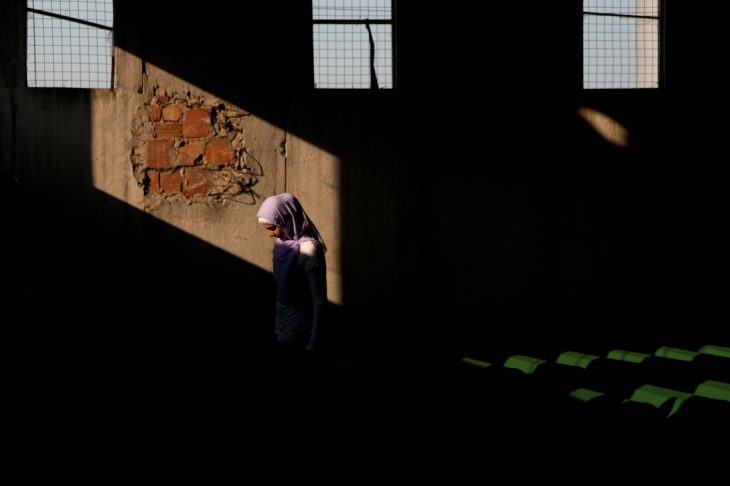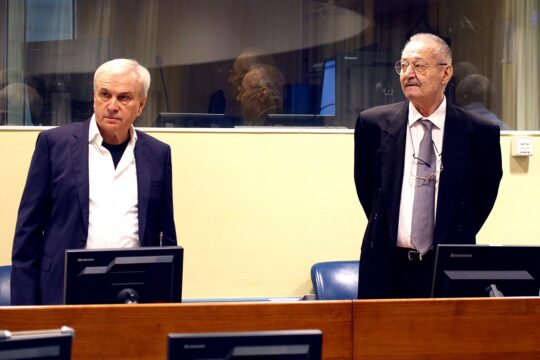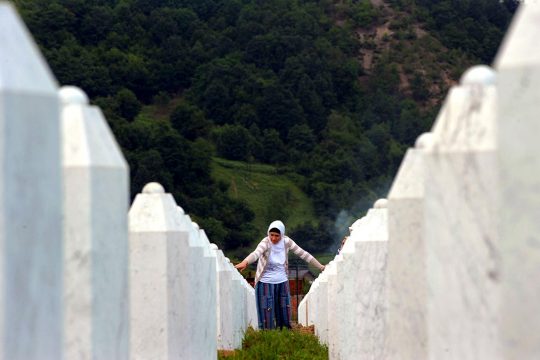The remains of 136 people killed in Srebrenica, Bosnia, in 1995 are being buried Saturday during a ceremony marking the 20th anniversary of a massacre whose qualification as genocide is still dividing both people in the region and the international community. According to the Bosnian institute for missing persons, this will bring to 6,241 the number of Srebrenica victims so far found and identified.
Twenty years after Serbian mass executions of Srebrenica Muslims in Bosnia, both local people and the international community still struggle with what happened. While Bosnians are divided over whether the murders should be classified as genocide, members of the international community still ask themselves whether they could have done anything different to prevent thousands of deaths.
During the war in Bosnia and Herzegovina, Srebrenica was in 1993 declared a `safe zone` and guarded by UN peacekeeping forces. On July 11,1995, the Bosnian Serb Army took over the town. Several thousand Muslim men were taken prisoner, while women and children were transported to territory under Bosnian Army control. According to judgments handed down by the International Criminal Tribunal for the former Yugoslavia (ICTY), in the days following the fall of Srebrenica, mass executions of captured Muslim men took place in several locations spread across an area up to 50km from Srebrenica. The ICTY concluded that the mass murders of more than 7,000 people constitute genocide. Fourteen Bosnian Serb army and police officers were sentenced for this crime, while the trials of former Bosnian Serb army commander Ratko Mladic and wartime Bosnian Serb President Radovan Karadzic are still ongoing.
Serb denial
As the anniversary has approached, members of the Bosnian Serb community are disputing more loudly the classification of crimes in Srebenica as genocide, and also the number of dead. There is a consensus among Serbs that terrible crimes happened in Srebrenica, but they contest that there was genocidal intent. At Mladic's ICTY trial, the defence is trying to prove that the military and political leadership did not plan the Srebrenica executions. His lawyers are claiming that murders were sparked by the uncontrolled revenge of the local Serbian population who suffered years of guerilla attacks from the Bosnian Muslim Army.
Current President of Republika Srpska (Serb entity in Bosnia Herzegovina) Milorad Dodik last week claimed that the ICTY based its genocide judgments on false evidence of the number killed. "We are told that we should not deny genocide," said Dodik in a speech broadcast on TV Republika Srpska. "How can we not deny a lie?"
Eric Gordy, southeast European studies tutor at University College London and author of the book "Guilt, Responsibility and Denial", thinks that although debate on qualification of crime as genocide is "inescapable", it brings "more harm than good".
"If that question was set aside, communities could concentrate on establishing facts, recognising and affirming victims, compensating people for suffering, and encouraging mutual understanding," Gordy told JusticeInfo.net.
For Srebrenica survivor Hasan Hasanovic, hearing Bosnian politicians denying genocide feels like "adding fuel to the fire". He says it annoys him that such statements are repeated in the media so often that they get accepted as truth by ordinary people."It hurts so much to realize that you are living in the country which is far from healing," Hasanovic told JusticeInfo.net.
International Division
Division over Srebenica goes beyond the local level, with Britain proposing a UN Security Council Resolution on the Srebrenica genocide. The Serbian side waged a political battle and Russia eventually vetoed the Resolution just three days before 20th anniversary.
While the Serbian and Bosnian sides are wrestling over recognition of genocide, members of the international community are grappling with their own role and whether they could have done anything different to prevent thousands of deaths.
Both current UN Secretary General Ban Ki Moon and his predecessor Kofi Annan have admitted that the UN failed in Srebrenica. This sentiment was also prevalent at a July conference of former top political and military leaders organized by The Hague Institute for Global Justice to discuss international decision making and the Srebrenica genocide.
Carl Bildt, European Union Special Envoy to the Former Yugoslavia at the time, stressed that the "cardinal mistake" of the international community was to create safe areas which were not safe.
"The UN Secretary General repeatedly said to the Security Council 'I do not have enough forces there, it is not going to work', " Bildt told the conference. "And the Security Council members said to the UN Secretary General 'We do not really care. We need to do something'."
Creation of "unserious" safe areas combined with a collapsed political process was "a recipe for disaster to come, " he said, "and that disaster did come in Srebrenica in July 1995".
Searching for truth
The last UN peacekeeping forces left in the enclave of Srebrenica were a Dutch battalion. Twenty years on, new information is still coming out about the role of the Dutch and the international community. Last week, people in the Netherlands had a chance to watch an investigative documentary film "Why Srebrenica had to fall”, analyzing a newly declassified set of US secret service documents. According to the documents, several weeks before the fall of Srebrenica, the US gathered intelligence that Serbs were about to attack. Still, a decision was made not to provide close air support, and to keep a low profile about it, despite DutchBat counting on promised air support.
Following the film, former members of Dutchbat expressed their shock in a statement asking for the truth on events in and around Srebrenica to be brought to light. “We want to keep on with our lives and not be faced with new information year after year,” they said.
"What we call truth is an assemblage of interpretations and contexts, and in history there are not too many of these, ” says Gordy. "Rather than truth, it is probably more important to have a set of facts that are known, that are well established, and that everybody accepts.
Former Srebrenica resident Muhamed Durakovic, seems to share this view. Also talking at The Hague Institute for Global Justice, he said that each ethnicity in Bosnia has its own version of the truth, and that current Bosnia is "not ready to talk about truth".
"Maybe the next generation would be willing to accept the truth, which everyone would have to recognize," he said. "But before that, we have to talk about facts."





